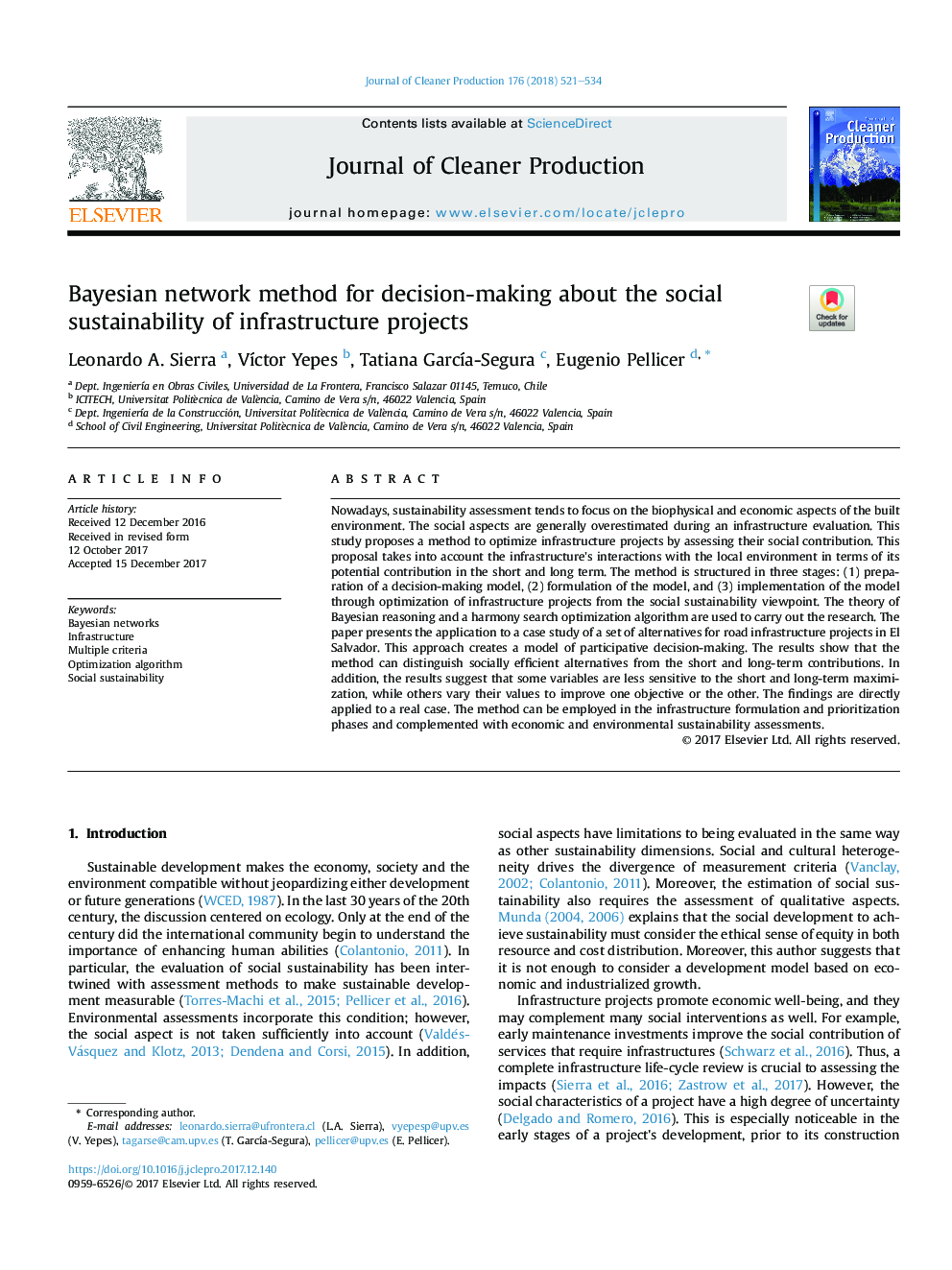| کد مقاله | کد نشریه | سال انتشار | مقاله انگلیسی | نسخه تمام متن |
|---|---|---|---|---|
| 8099154 | 1522077 | 2018 | 14 صفحه PDF | دانلود رایگان |
عنوان انگلیسی مقاله ISI
Bayesian network method for decision-making about the social sustainability of infrastructure projects
ترجمه فارسی عنوان
روش شبکه بیزی برای تصمیم گیری در مورد پایداری اجتماعی پروژه های زیربنایی
دانلود مقاله + سفارش ترجمه
دانلود مقاله ISI انگلیسی
رایگان برای ایرانیان
کلمات کلیدی
شبکه های بیزی، زیر ساخت، معیارهای چندگانه، الگوریتم بهینه سازی، پایداری اجتماعی،
ترجمه چکیده
امروزه ارزیابی پایداری تمایل به تمرکز بر جنبه های بیوفیزیکی و اقتصادی محیط زیست را دارد. جنبه های اجتماعی به طور کلی در طول ارزیابی زیرساخت ها بیش از حد افزایش یافته است. این مطالعه پیشنهاد می دهد یک روش برای بهینه سازی پروژه های زیربنایی با ارزیابی مشارکت اجتماعی آنها. این پیشنهاد با توجه به سهم بالقوه خود در کوتاه مدت و بلند مدت، تعاملات زیربنایی با محیط محلی را در نظر می گیرد. این روش در سه مرحله تشکیل شده است: (1) تهیه یک مدل تصمیم گیری، (2) فرموله کردن مدل و (3) اجرای مدل از طریق بهینه سازی پروژه های زیربنایی از دیدگاه پایداری اجتماعی. نظریه استدلال بیزی و الگوریتم بهینه سازی جستجوی هارمونی برای انجام تحقیق مورد استفاده قرار می گیرند. این مقاله کاربردی را برای مطالعه موردی مجموعه ای از گزینه های پروژه های زیربنایی جاده در السالوادور ارائه می دهد. این رویکرد یک مدل تصمیم گیری مشارکتی را ایجاد می کند. نتایج نشان می دهد که این روش می تواند گزینه های اجتماعی کارآمد را از کمک های کوتاه مدت و بلند مدت تشخیص دهد. علاوه بر این، نتایج نشان می دهد که برخی از متغیر ها کمتر به حداکثر رساندن کوتاهی و بلند مدت حساس هستند، در حالی که دیگران ارزش های خود را برای بهبود یک هدف یا دیگری متفاوت می کنند. یافته ها به طور مستقیم به یک مورد واقعی اعمال می شود. این روش می تواند در فرآیند ساختار زیر ساخت و اولویت بندی و با ارزیابی پایداری اقتصادی و محیط زیست مورد استفاده قرار گیرد.
موضوعات مرتبط
مهندسی و علوم پایه
مهندسی انرژی
انرژی های تجدید پذیر، توسعه پایدار و محیط زیست
چکیده انگلیسی
Nowadays, sustainability assessment tends to focus on the biophysical and economic aspects of the built environment. The social aspects are generally overestimated during an infrastructure evaluation. This study proposes a method to optimize infrastructure projects by assessing their social contribution. This proposal takes into account the infrastructure's interactions with the local environment in terms of its potential contribution in the short and long term. The method is structured in three stages: (1) preparation of a decision-making model, (2) formulation of the model, and (3) implementation of the model through optimization of infrastructure projects from the social sustainability viewpoint. The theory of Bayesian reasoning and a harmony search optimization algorithm are used to carry out the research. The paper presents the application to a case study of a set of alternatives for road infrastructure projects in El Salvador. This approach creates a model of participative decision-making. The results show that the method can distinguish socially efficient alternatives from the short and long-term contributions. In addition, the results suggest that some variables are less sensitive to the short and long-term maximization, while others vary their values to improve one objective or the other. The findings are directly applied to a real case. The method can be employed in the infrastructure formulation and prioritization phases and complemented with economic and environmental sustainability assessments.
ناشر
Database: Elsevier - ScienceDirect (ساینس دایرکت)
Journal: Journal of Cleaner Production - Volume 176, 1 March 2018, Pages 521-534
Journal: Journal of Cleaner Production - Volume 176, 1 March 2018, Pages 521-534
نویسندگان
Leonardo A. Sierra, VÃctor Yepes, Tatiana GarcÃa-Segura, Eugenio Pellicer,
